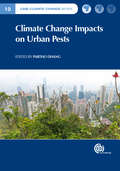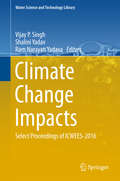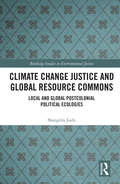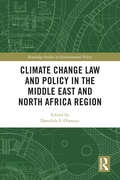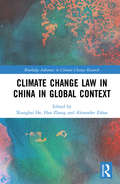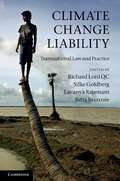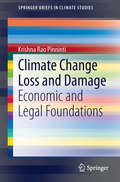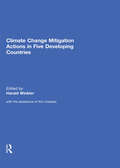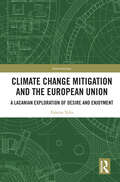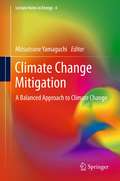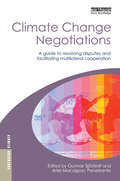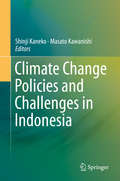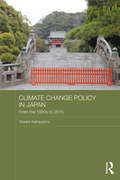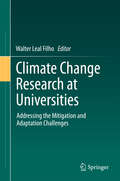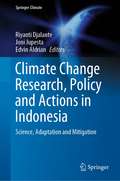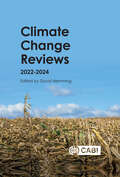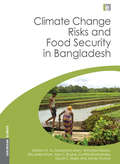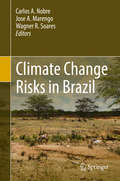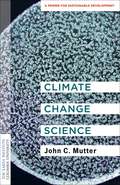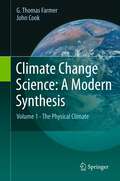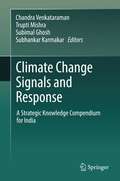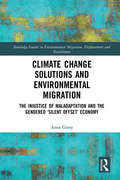- Table View
- List View
Climate Change Impacts on Urban Pests
by Partho DhangThis book is the first resource to review the influence of climate change on urban and public pests such as mosquitoes, flies, ticks, and wood pests, with respect to population, distribution, disease, damage and control. It systematically addresses how the impact of climate change on pests in urban areas differs from natural areas, focusing on the increased temperatures of urban locations, the effect of natural disasters, the manner of land use and the consequences of human habitation. Climate Change Impacts on Urban Pests: - covers key information on how climate change and urban pests affect human health - includes coverage of the impacts of natural disasters such as flooding looks at issues which could influence the management of pests - explores a range of international opinion from recognised authorities covering six continents. Presenting up-to-date knowledge, this book is an essential resource for researchers in urban pests, entomology and public health, as well as scientists, environmentalists and policy makers involved in studies on climate change.
Climate Change Impacts on Urban Pests (CABI Climate Change Series #7)
by David Liszka Roberto Pereira Richard Comont Steven Sims Arthur Appel Chester Moore Carrie Cottone Nan-Yao Su Donald Ewart Lina Nunes Teresa De Troya Magadelina Kutnik Mohamed Sallam Philip Koehler Aleksandra Gliniewicz Grzegorz Karbowiak Ewa Mikulak Marta Supergan-Marwicz Agnieszka Królasik Joanna Myslewicz Tamara Nunes de Lima-Camara Nildimar Alves Honório Eliningaya Kweka Dr Humphrey D. Mazigo Dr Yousif Himeidan Dr Domenica Morona Dr Stephen Munga Dr Ramesh Dhiman Pawel Swietoslawski Dr Martha Macedo De Lima BarataThis book is the first resource to review the influence of climate change on urban and public pests such as mosquitoes, flies, ticks, and wood pests, with respect to population, distribution, disease, damage and control. It systematically addresses how the impact of climate change on pests in urban areas differs from natural areas, focusing on the increased temperatures of urban locations, the effect of natural disasters, the manner of land use and the consequences of human habitation. Climate Change Impacts on Urban Pests: - covers key information on how climate change and urban pests affect human health - includes coverage of the impacts of natural disasters such as flooding looks at issues which could influence the management of pests - explores a range of international opinion from recognised authorities covering six continents. Presenting up-to-date knowledge, this book is an essential resource for researchers in urban pests, entomology and public health, as well as scientists, environmentalists and policy makers involved in studies on climate change.
Climate Change Impacts: Select Proceedings of ICWEES-2016 (Water Science and Technology Library #82)
by Vijay P Singh Shalini Yadav Ram Narayan YadavaThis book comprises the select proceedings of the International Conference on Water, Environment, Energy and Society. The book is divided into four parts. Part I deals with some aspects of climatic characteristics ranging from changes in temperature and sunshine hours to downscaling to global climate patterns and effects of El Ni#65533;o-Southern Oscillation (ENSO) and Indian Ocean Dipole (IOD) on extreme rainfall. Part II covers rainfall analysis, including changes in regional rainfall series, analysis of non-stationarity, summer monsoon and rainfall scenarios. Impacts of climate change are treated in Part III. Change point analysis, greenhouse gas emissions, rainfall variability, water resources variability, and water resources sustainability are discussed in this part. The concluding Part IV is on low flow and drought. It deals with the Standardized Precipitation Index (SPI) concept and assessment of drought. This book is of interest to researchers and practitioners in the field of water resources, hydrology, environmental resources, agricultural engineering, watershed management, and earth sciences, as well as those engaged in natural resources planning and management. Graduate students and those wishing to conduct further research in water and environment and their development and management find the book to be of value.
Climate Change Justice and Global Resource Commons: Local and Global Postcolonial Political Ecologies (Routledge Studies in Environmental Justice)
by Shangrila JoshiThis book examines the multiple scales at which the inequities of climate change are borne out. Shangrila Joshi engages in a multi-scalar analysis of the myriad ways in which various resource commons – predominantly atmosphere and forests – are implicated in climate governance, with a consistent emphasis throughout on the justice implications for disenfranchised communities. The book starts with an analysis of North-South inequities in responsibility, vulnerability, and capability, as evidenced in global climate treaty negotiations from Rio to Paris. It then moves on to examine the ways in which structural inequalities are built into the conceptualization and operationalization of various neoliberal climate solutions such as Reducing Emissions from Deforestation and Forest Degradation (REDD+) and the Clean Development Mechanism (CDM). Drawing on qualitative interviews conducted in Delhi, Kathmandu, and the Terai region of Nepal, participant observation at the Climate Conference in Copenhagen (COP-15), and textual analysis of official documents, the book articulates a geography of climate justice, considering how ideas of injustice pertaining to colonialism, race, Indigeneity, caste, gender, and global inequality intersect with the politics of scale. This book will be of great interest to students and scholars of environmental justice, climate justice, climate policy, political ecology, and South Asian studies.
Climate Change Law and Policy in the Middle East and North Africa Region (Routledge Studies in Environmental Policy)
by Damilola S. OlawuyiClimate Change Law and Policy in the Middle East and North Africa Region provides an in-depth and authoritative examination of the guiding principles of climate change law and policy in the MENA region. This volume introduces readers to the latest developments in the regulation of climate change across the region, including the applicable legislation, institutions, and key legal innovations in climate change financing, infrastructure development, and education. It outlines participatory and bottom-up legal strategies—focusing on transparency, accountability, gender justice, and other human rights safeguards—needed to achieve greater coherence and coordination in the design, approval, financing, and implementation of climate response projects across the region. With contributions from a range of experts in the field, the collection reflects on how MENA countries can advance existing national strategies around climate change, green economy, and low carbon futures through clear and comprehensive legislation. Taking an international and comparative approach, this book will be of great interest to students, scholars, and practitioners who work in the areas of climate change, environmental law and policy, and sustainable development, particularly in relation to the MENA region.
Climate Change Law in China in Global Context (Routledge Advances in Climate Change Research)
by Alexander Zahar Hao Zhang Xiangbai HeIn Climate Change Law in China in Global Context, seven climate change law scholars explain how the country’s legal system is gradually being mobilized to support the reduction of greenhouse gas emissions in China and achieve adaptation to climate change. There has been little English scholarship on the legal regime for climate change in China. This volume addresses this gap in the literature and focuses on recent attempts by the country to build defences against the impacts of climate change and to meet the country’s international obligations on mitigation. The authors are not only interested in China’s laws on paper; rather, the book explains how these laws are implemented and integrated in practice and sheds light on China’s current laws, laws in preparation, the changing standing of law relative to policy, and the further reforms that will be necessary in response to the 2015 Paris Agreement on Climate Change. This comprehensive and critical account of the Chinese legal system’s response to the pressures of climate change will be an important resource for scholars of international law, environmental law, and Chinese law.
Climate Change Liability
by Richard Lord Jutta Brunnée Lavanya Rajamani Silke GoldbergAs frustration mounts in some quarters at the perceived inadequacy or speed of international action on climate change, and as the likelihood of significant impacts grows, the focus is increasingly turning to liability for climate change damage. Actual or potential climate change liability implicates a growing range of actors, including governments, industry, businesses, non-governmental organisations, individuals and legal practitioners. Climate Change Liability provides an objective, rigorous and accessible overview of the existing law and the direction it might take in seventeen developed and developing countries and the European Union. In some jurisdictions, the applicable law is less developed and less the subject of current debate. In others, actions for various kinds of climate change liability have already been brought, including high profile cases such as Massachusetts v. EPA in the United States. Each chapter explores the potential for and barriers to climate change liability in private and public law.
Climate Change Liability
by Richard Lord Jutta Brunnée Lavanya Rajamani Silke GoldbergAs frustration mounts in some quarters at the perceived inadequacy or speed of international action on climate change, and as the likelihood of significant impacts grows, the focus is increasingly turning to liability for climate change damage. Actual or potential climate change liability implicates a growing range of actors, including governments, industry, businesses, non-governmental organisations, individuals and legal practitioners. Climate Change Liability provides an objective, rigorous and accessible overview of the existing law and the direction it might take in seventeen developed and developing countries and the European Union. In some jurisdictions, the applicable law is less developed and less the subject of current debate. In others, actions for various kinds of climate change liability have already been brought, including high profile cases such as Massachusetts v. EPA in the United States. Each chapter explores the potential for and barriers to climate change liability in private and public law.
Climate Change Loss and Damage: Economic and Legal Foundations (SpringerBriefs in Climate Studies)
by Krishna Rao PinnintiThis text works to establish essential foundations and guidelines in the current process of providing strategies, mechanisms and resources for mitigating loss and damage from the adverse impacts of climate change and climate variability. This builds on the groundwork done by the UNFCCC and other entities to facilitate the processes at the international level, pursuing a pragmatic approach and the objective specification of relevant frameworks for further actions. The primary goal is the development of integrated approaches to the assessment and reduction of loss and damage due to climate change (including climate variability), encompassing both economic and legal dimensions. The publication is aimed at readers in top-level policymaking and strategy development on the national and international level, as well as academia.
Climate Change Mitigation Actions in Five Developing Countries
by Harald Winkler with the assistance of Kim CoetzeeFive case studies on mitigation actions (MAs) in developing countries illustrate the rich diversity of climate action. Researchers from Brazil, Chile, Colombia, Peru and South Africa reflect on what is possible in their countries. Case studies reflect the sheer diversity of NAMAs: from a ‘Pronami’ on efficient lighting in Peru, to longer-term challenges of rising energy emissions in Brazil, and much else. The book compares the similarities and differences across eight elements that could assist in developing and implementing mitigation. The comparative analysis highlights both how challenging implementation can be in the context of development, but also points to factors that might enable ambitious mitigation. The comparison suggests that choice of Mas may be linked to institutional capacity, the resources a country is endowed with and hence its emissions profile. International support can be an important global enabler. The authors find that addressing both development and climate objectives is key. This book fills an important gap in the literature from developing country authors about mitigation actions in their own countries. This book was published as a special issue of Climate and Development.
Climate Change Mitigation and the European Union: A Lacanian Exploration of Desire and Enjoyment (Interventions)
by Valeria TolisThis book focuses on the European Union’s (EU) climate change mitigation actions, developing a critical framework for the 2030 Clean energy for all Europeans package and the 2050 long-term decarbonisation strategy, which informed the European Green Deal.Reflecting on the possibility of real change and transition, the author develops a Lacanian-based discourse analysis which reflects on agentic capacities and assesses both the status quo and changes in the discourse. Informed by extensive fieldwork in Brussels and at the UN Framework Convention on Climate Change Conferences of the Parties, this interdisciplinary book spans global environmental politics, international relations, EU studies, and discourse theories/analysis.It will be of particular interest to those working in critical theory, subjectivity, language, and materiality and intersects with a wide range of disciplines such as philosophy, sociology, anthropology, geography, linguistics, and psychology.
Climate Change Mitigation: A Balanced Approach to Climate Change (Lecture Notes in Energy #4)
by Mitsutsune YamaguchiClimate change is mainly caused by emissions of CO2 from burning fossil fuels, which provides over 85% of the world's energy. Strategies for mitigating climate change are connected with handling economic and social activities through their effects on the use of energy. Climate Change Mitigation investigates the costs of mitigation measures in comparison to their benefits, and compares the effects of implementing mitigation measures on various areas such as energy security and energy economy. "For 20 years, diplomats have struggled to make progress on climate change, mostly because global diplomacy is not well-linked to the realities of how nations and firms control emissions and adapt to the impacts of a changing climate. In this excellent book, Dr Yamaguchi has assembled experts to guide the redesign of global policy. The authors underscore how global warming efforts must resonate with other policy goals." David G. Victor, Director, Laboratory on International Law and Regulation and Professor, University of California San Diego "Climate Change Mitigation clarifies that climate change cannot be controlled by sacrificing economic growth or other global problems; however, action to control climate change cannot be delayed.Climate policy is pervasive and affects all dimensions of international policy;but it cannot be too ambitious: a balanced approach between mitigation and adaptation, economic growth and resource management, and short term development and long term investments, should be adopted. I recommend its reading." Carlo Carraro,President, Ca' Foscari University of Venice "The International Energy Agency estimates for every $1 of investment now toward sustainable energy, $4 of future spending can be saved. There is a business case for companies to reduce energy use. Companies in the energy and resource intensive industries must lead the way." Chad Holliday, Chairman. World Business Council for Sustainable Development and former Chair and CEO, DuPont
Climate Change Negotiations: A Guide to Resolving Disputes and Facilitating Multilateral Cooperation
by Gunnar Sjöstedt Ariel Macaspac PenetranteAs the Kyoto Protocol limps along without the participation of the US and Australia, on-going climate negotiations are plagued by competing national and business interests that are creating stumbling blocks to success. Climate Change Negotiations: A Guide to Resolving Disputes and Facilitating Multilateral Cooperation asks how these persistent obstacles can be down-scaled, approaching them from five professional perspectives: a top policy-maker, a senior negotiator, a leading scientist, an international lawyer, and a sociologist who is observing the process. The authors identify the major problems, including great power strategies (the EU, the US and Russia), leadership, the role of NGOs, capacity and knowledge-building, airline industry emissions, insurance and risk transfer instruments, problems of cost benefit analysis, the IPCC in the post-Kyoto situation, and verification and institutional design. A new key concept is introduced: strategic facilitation. 'Strategic facilitation' has a long time frame, a forward-looking orientation and aims to support the overall negotiation process rather than individual actors. This book is aimed at academics, university students and practitioners who are directly or indirectly engaged in the international climate negotiation as policy makers, diplomats or experts.
Climate Change Policies and Challenges in Indonesia
by Shinji Kaneko Masato KawanishiThis book demonstrates the challenges and opportunities of climate change actions in developing countries and primarily focuses on case studies in Indonesia, the world's fourth most populous country. The most important feature of the book is its examination of multiple facets of climate change issues in Indonesia, which allows readers to understand the complexity of climate change in developing countries: the synergies and trade-offs between different climate change actions as well as between climate and development priorities. Another unique feature is that it was jointly written by Indonesian and international authors, as well as by academics and development practitioners. This book addresses questions concerning mitigation measures in major sectors with original analyses of aspects including energy subsidies, sectoral energy efficiencies in manufacturing sectors, forest concessions, energy-saving labeling schemes, policy mixes for the urban transportation sector, and the introduction of waste-to-energy technologies. The book provides first-hand knowledge and data on energy and the institutional realities in Indonesia, which are not widely and readily available to an international audience. It offers a valuable reference guide for professionals working for governments and NGOs and donor agencies in the fields of climate change and development in developing countries. This work is also a valuable resource for undergraduate and graduate students of economics and environmental and development studies, in particular those who are interested in the synergies and conflicts between climate change and development.
Climate Change Policy in Japan: From the 1980s to 2015 (Routledge Studies in Asia and the Environment)
by Yasuko KameyamaAmidst growing environmental concerns worldwide, Japan is seen as particularly vulnerable to the effects of changing climate. This book considers Japan’s response to the climate change problem from the late 1980s up to the present day, assessing how the Japanese government’s policy-making process has developed over time. From the early days of climate change policy in Japan, through the United Nations Framework Convention on Climate Change conferences and Kyoto Protocol, right up to the 2015 negotiations, the book examines the environmental, economic, and political factors that have shaped policy. As the 2015 Conference of the Parties to the United Nations Framework Convention on Climate Change projects forward beyond 2020, the book concludes by analyzing how Japan has placed itself in the global climate change debate and how the country might and should respond to the problem in the future, based on the findings from accumulated history.
Climate Change Policy in North America
by A. Neil Craik Debora Van Nijnatten Isabel StuderWhile no supranational institutions exist to govern climate change in North America, a system of cooperation among a diverse range of actors and institutions is currently emerging. Given the range of interests that influence climate policy across political boundaries, can these distinct parts be integrated into a coherent, and ultimately resilient system of regional climate cooperation?Climate Change Policy in North America is the first book to examine how cooperation respecting climate change can emerge within decentralized governance arrangements. Leading scholars from a variety of disciplines provide in-depth case studies of climate cooperation initiatives - such as emissions trading, energy cooperation, climate finance, carbon accounting and international trade - as well as analysis of the institutional, political, and economic conditions that influence climate policy integration.
Climate Change Research at Universities: Addressing the Mitigation and Adaptation Challenges
by Walter Leal FilhoThis unique book provides a multidisciplinary review of current, climate-change research projects at universities around the globe, offering perspectives from all of the natural and social sciences. Numerous universities worldwide pursue state-of-the-art research on climate change, focussing on mitigation of its effects as well as human adaptation to it. However, the 2015 Paris 21st Conference of the Parties of the United Nations Framework Convention on Climate Change (UNFCCC) (COP 21)" demonstrated that there is still much room for improvement in the role played by universities in international negotiations and decision-making on climate change. To date, few scientific meetings have provided multidisciplinary perspectives on climate change in which researchers across the natural and social sciences could come together to exchange research findings and discuss methods relating to climate change mitigation and adaption studies. As a result the published literature has also lacked a broad perspective. This book fills that gap and is of interest to all researchers and policy-makers concerned with global climate change regardless of their area of expertise.
Climate Change Research, Policy and Actions in Indonesia: Science, Adaptation and Mitigation (Springer Climate)
by Joni Jupesta Riyanti Djalante Edvin AldrianThis edited volume reviews the latest advances in policies and actions in understanding the science, impacts and management of climate change in Indonesia. Indonesia is one of the most vulnerable countries to climate change due to its geographical, physical, and social-economic situations. There are many initiatives to understand and deal with the impacts in the country. The national government has issued key guiding policies for climate change. International agencies together with local stakeholders are working on strengthening the capacity in the policy formulations and implement actions to build community resilience. Universities are conducting research on climate change related at different scales. Cities and local governments are implementing innovations in adapting to the impacts of climate change and transiting toward green economy. This book summarizes and discusses the state-of-the-art regarding climate change in Indonesia including adaptation and mitigation measures. The primary readership of the book includes policy makers, scientists and practitioners of climate change actions in Indonesia and other countries facing similar challenges.
Climate Change Reviews: 2022-2024
by David HemmingClimate change is a reality that affects all aspects of agriculture, and is also impacted by agriculture. This collection of articles looks at a range of topics including: Impact on pollinators, key crops, farming systems, animal welfare and on humans, role of farmer organisations in extending use of climate-smart practices, genetic resources able to cope with climate change, including wild relatives and breeding for improved tolerance, how rhizobacteria can improve resilience, mitigation of livestock greenhouse gas emissions and the push for climate neutrality in the dairy industry and carbon storage in grasslands and seaweed. These articles have been published in the journal CABI Reviews.
Climate Change Risks and Food Security in Bangladesh (Earthscan Climate)
by Cynthia Rosenzweig Mozaharul Alam James Thurlow Winston Yu Ahmadul Hassan Abu Saleh Khan Alex Ruane David MajorManaging climate variability and change remains a key development and food security issue in Bangladesh. Despite significant investments, floods, droughts, and cyclones during the last two decades continue to cause extensive economic damage and impair livelihoods. Climate change will pose additional risks to ongoing efforts to reduce poverty. This book examines the implications of climate change on food security in Bangladesh and identifies adaptation measures in the agriculture sector using a comprehensive integrated framework. First, the most recent science available is used to characterize current climate and hydrology and its potential changes. Second, country-specific survey and biophysical data is used to derive more realistic and accurate agricultural impact functions and simulations. A range of climate risks (i.e. warmer temperatures, higher carbon dioxide concentrations, changing characteristics of floods, droughts and potential sea level rise) is considered to gain a more complete picture of potential agriculture impacts. Third, while estimating changes in production is important, economic responses may to some degree buffer against the physical losses predicted, and an assessment is made of these. Food security is dependent not only on production, but also future food requirements, income levels and commodity prices. Finally, adaptation possibilities are identified for the sector. This book is the first to combine these multiple disciplines and analytical procedures to comprehensively address these impacts. The framework will serve as a useful guide to design policy intervention strategies and investments in adaptation measures.
Climate Change Risks in Brazil
by Carlos A. Nobre Jose A. Marengo Wagner R. SoaresThis book maps extreme temperature increase under dangerous climate change scenarios in Brazil and their impacts on four key sectors: agriculture, health, biodiversity and energy. The book draws on a careful review of the literature and climate projections, including relative risk estimates. This synthesis summarizes the state-of-the-art knowledge and provides decision-makers with risk analysis tools, to be incorporated in public planning policy, in order to understand climate events which may occur and which may have significant consequences.
Climate Change Science: A Primer for Sustainable Development (Columbia University Earth Institute Sustainability Primers)
by Dr. John C. MutterHow will future climates be different from today’s world—and what consequences will changes in climate have for societies and their development strategies? This book is a primer on the essential science for grasping the workings of climate change and climate prediction. It is accessible for readers with little to no background in science, with an emphasis on the needs of those studying sustainable development.John C. Mutter gives a just-the-facts overview of how the climate system functions and what we know about why changes occur. He recounts the evolution of climatology from the earliest discoveries about Earth’s climate to present-day predictive capabilities, and clearly presents the scientific basis of fundamental topics such as climate zones, ocean-atmosphere dynamics, and the long-term cycles from glacial to interglacial periods. Mutter also details the mechanisms of climate change and the ways in which human activity affects global climate. He explains the science behind some known consequences of rising temperatures, such as sea level rise, hurricane behavior, and climate variability. The primer discusses how climate predictions are made and examines the sources of uncertainty in forecasting. Climate Change Science is a straightforward and easy-to-read treatment of the fundamental science needed to comprehend one of today’s most important issues.
Climate Change Science: Volume 1 - The Physical Climate
by John Cook G. Thomas FarmerAn introduction to the principles of climate change science with an emphasis on the empirical evidence for climate change and a warming world. Additional readings are given at the end of each chapter. A list of "Things to Know" opens each chapter. Chapters are arranged so that the student is first introduced to the scientific method(s), examples of the use of the scientific method from other sciences drawn from the history of science with an emphasis on climate science. Climate science is treated in each chapter based on the premise of global warming. Chapter treatments on the atmosphere. biosphere, geosphere, hydrosphere, and anthroposphere and their inter-relationships are given.
Climate Change Signals and Response: A Strategic Knowledge Compendium for India
by Chandra Venkataraman Trupti Mishra Subimal Ghosh Subhankar KarmakarThis book provides a synthesis of research findings, in terms of strategic knowledge outcomes regarding emergence of recent regional climate signals, implications for impacts assessment, and mitigation and adaptation response, relevant in the Indian context. The first part discusses evidence of climate change and its underlying scientific processes across India, chiefly focusing on impacts that are already visible and attributable to anthropogenic activities. The latter part deals with the responses to climate change, highlighting the mitigation and adaptation strategies in various sectors and communities.The book presents a concise interpretation, distilling practical recommendations and policy prescriptions at national and sub-national levels. It serves as a reference point for understanding scientific advances and persisting uncertainty, future vulnerability and response capacity of interlinked human and natural systems, pertaining to India. It is an excellent resource for policy makers and industry watchers in addition to the research fraternity.
Climate Change Solutions and Environmental Migration: The Injustice of Maladaptation and the Gendered 'Silent Offset' Economy (Routledge Studies in Environmental Migration, Displacement and Resettlement)
by Anna GintyThis book lifts the taboo on maladaptation, a different driver of environmentally induced migration, which shines a light on the negative consequences arising from the solutions to climate change, adaptation and mitigation policies. Through a systematic analysis and critique of existing mitigation and adaptation polices under the United Nations Framework Convention on Climate Change (UNFCCC) and international development community, and supplemented by a small empirical study in Indonesia, this book catalogues how maladaptation is manufactured under existing climate change solutions. It posits that customary communities in general- and women in particular- are disproportionately affected by the dominant market-driven logics that underscore current climate change solutions adopted by the UNFCCC. The injustice of maladaptation is highlighted as multi-faceted and explored using political, economic, social and ecological lenses, and the concept of environmental reintegration is also explored as a possible solution to this issue. Further possibilities are then presented in the Afterword, as a combination of what the new (post-neoliberalism) conjuncture could potentially look like. This volume will be of great interest to students, scholars and practitioners of climate change, environmental policy, environmental migration and displacement, development studies, I/NGOs and civil society actors and activists more broadly.
